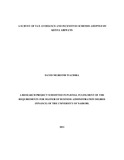| dc.description.abstract | Kenya Airways was established in 1977 as with a core purpose to contribute to the sustainable
development of Africa. Tax avoidance and tax incentives are adopted by Kenya Airways to
modify the financial situation and make investments correspondingly. The main objective of the
study was to determine the benefits and effectiveness of tax avoidance strategies adopted by
Kenya Airways. The respondents of the study involved the Tax Manager, and the supporting
officers in Kenya Airways tax department. A semi structured questionnaire was applied as the
data collection tool that involved both open and closed format questions. The Statistical Package for Social Sciences (SPSS) was adopted in the analysis.
The findings of the study show that Kenya Airway comprehensively looks at various tax options
in order to take full advantage of all available tax deductions, both business and personal. This is adopted so that the company can bear the lowest legal tax liability in the core business. Kenya Airways has implemented strict measures to avoid tax evasion that is the reduction of tax through deceit, subterfuge, and concealment. Implementing tax avoidance strategies has been done by changing one's tax residence to a tax haven and adopting the double taxation treaties as applied in other countries. However the study reveals that employees in KA do not use legal avoidance of personal taxation but instead separate legal entity to which one's property is donated is created. Tax avoidance is deemed advantageous in that it reduces the amount of taxable income, reduces tax rates, it controls the time when the tax must be paid, helps to claim any available tax credits, avoiding the most common tax planning mistakes and controls the effects of the alternative minimum tax. The schemes also help in minimizing restrictions on tax planning, preparing income tax return and attending to personal tax issues. However tax avoidance and incentives have not been effective in tax exemption in different employees status thought it is the appropriate strategy to minimize tax obligations before they occur for example, by the use of outsourced employees and independent contractors to avoid employment taxes.
The study finds the tax and incentives scheme in Kenya Airways as effectives and recommends
tax holidays and investment allowances and tax credits to be provided to the employees as a
motivational initiative. The study also suggests further research studies in the area of the role of
tax avoidance and incentive in the motivation of Kenya airways employees. | en |

